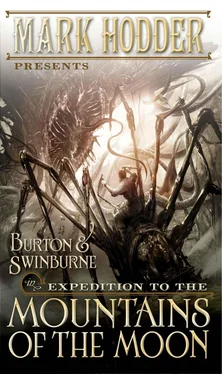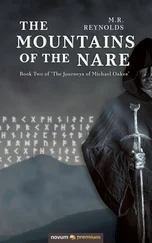Mark Hodder - Expedition to the Mountains of the Moon
Здесь есть возможность читать онлайн «Mark Hodder - Expedition to the Mountains of the Moon» весь текст электронной книги совершенно бесплатно (целиком полную версию без сокращений). В некоторых случаях можно слушать аудио, скачать через торрент в формате fb2 и присутствует краткое содержание. Жанр: sf_stimpank, на английском языке. Описание произведения, (предисловие) а так же отзывы посетителей доступны на портале библиотеки ЛибКат.
- Название:Expedition to the Mountains of the Moon
- Автор:
- Жанр:
- Год:неизвестен
- ISBN:нет данных
- Рейтинг книги:5 / 5. Голосов: 1
-
Избранное:Добавить в избранное
- Отзывы:
-
Ваша оценка:
- 100
- 1
- 2
- 3
- 4
- 5
Expedition to the Mountains of the Moon: краткое содержание, описание и аннотация
Предлагаем к чтению аннотацию, описание, краткое содержание или предисловие (зависит от того, что написал сам автор книги «Expedition to the Mountains of the Moon»). Если вы не нашли необходимую информацию о книге — напишите в комментариях, мы постараемся отыскать её.
Expedition to the Mountains of the Moon — читать онлайн бесплатно полную книгу (весь текст) целиком
Ниже представлен текст книги, разбитый по страницам. Система сохранения места последней прочитанной страницы, позволяет с удобством читать онлайн бесплатно книгу «Expedition to the Mountains of the Moon», без необходимости каждый раз заново искать на чём Вы остановились. Поставьте закладку, и сможете в любой момент перейти на страницу, на которой закончили чтение.
Интервал:
Закладка:
CHAPTER 5
“A Phenomenal Success.”
FLOR DE DINDIGUL
A Medium-Mild Indian Cigar
“Will bear favourable comparison
with choice Havanas,
while the cost is about one-third.”
Indian Tobacco, grown by Messrs. Slightly and Co.,
is eugenically enhanced for exquisitely choice
flavour and delicate aroma.
A DELIGHTFUL WHIFF
22/- per 100 from all good Tobacconists.
Sir Richard Francis Burton was leaning against a palm tree just beyond the final cottage of Kaltenberg. Beside him, Bertie Wells, sitting on a rock, was dabbing at a small wound on the back of his neck with a handkerchief. Burton had just used a penknife to dig a jigger flea out from beneath the war correspondent's skin.
From the trees around them, the shrieks and cackles of birds and monkeys blended into a cacophonous racket.
High overhead, eagles wheeled majestically through the dazzling sky.
The terrain in front of the two men angled down to the outlying houses and huts of Tanga.
Burton squinted, looking across the rooftops of the sprawling town to the ocean beyond. It was like peering through glass; the atmosphere was solid with heat. The humidity pressed against him, making his skin prickle. Respiration required a conscious effort, with each scalding breath having to be sucked in, the air resisting, as if too lethargic to move.
Wells pointed at a large building in the western part of the seaport.“That's the railway terminal. Two major lines run from it-the Tanganyika, all the way west to the lake; and the Usambara, up to Kilimanjaro.”
“Language is an astonishingly liquid affair,” Burton muttered. “We pronounced it Kilima Njaro in my day. Like the natives.”
“Perhaps some still do,” Wells replied. “But it's the fluid quality that makes language an excellent tool for imperialists. Force people to speak like you and soon enough they'll be thinking like you. Rename their villages, towns, and mountains, and before they know it, they're inhabiting your territory. So Kilimanjaro it is. Anyway, as I was saying, that's the station and our forces need to capture or destroy it to slow down the movement of German troops and supplies.” He indicated a twin-funnelled warship lying at anchor in the bay. “And that's HMS Fox. She's almost two decades obsolete but such is our desperation that we have to resort to whatever's available. She's been sweeping the harbour for mines. Look at her flags. Do you understand the signal?”
“No.”
“It's a demand for surrender. The British Indian Expeditionary Force transports have already offloaded the troops onto the beaches. They're awaiting the order to attack. The Fox's captain will lead the assault. He's probably waiting for Aitken to get our lot into position. It won't be long now.”
Burton frowned. “The town looks uninhabited.”
Wells glanced at his bloodstained handkerchief and pushed it into a pocket. “They're all hiding indoors,” he said. “They've known the attack was coming for a couple of days.”
Burton closed his eyes, removed his helmet, and massaged his scalp with his fingertips.
Wells looked at him and asked, “Is that tattoo of yours hurting?”
“No. It's just that-I don't know-I feel like I should be somewhere else.”
“Ha! Don't we all!”
They lapsed into silence, broken a few minutes later when Wells said, “I have a theory about it. Your tattoo, I mean. It looks African in pattern. You still don't recall how you got it?”
“No.”
“I think perhaps you were captured and tortured by some obscure tribe. There are still a few independent ones scattered about, especially up around the Blood Jungle where you were found. Certainly the state you were in suggests some sort of trauma in addition to the malaria and shell shock, and the tattoo possesses a ritualistic look.”
“It's possible, I suppose, but your theory doesn't ring any bells. Why is it called the Blood Jungle?”
“Because it's red. It's the thickest and most impassable jungle on the whole continent. The Germans have been trying to burn it away for I don't know how long but it grows back faster than they can destroy it.”
An hour passed before, in the distance, a bugle sounded. Others took up its call; then more, much closer.
Wells used a crutch to lever himself to his feet. He leaned on it, raised his binoculars, and said, “Here we go. Stay on your toes, we're closer to the action than I'd like.”
A single shot echoed from afar and, instantly, the birds in the trees became silent. For a moment there was no sound at all, then came a staccato roar as thousands of firearms let loose their bullets. An explosion shook the port.
Below and to his left, Burton saw a long line of British Askaris emerging from the undergrowth, moving cautiously into the town. They had hardly set foot past the outermost shack before they were caught in a hail of gunfire from windows and doorways. As men fell and others scattered for cover, Wells let loose a cry: “Bloody hell!”
A stray bullet whistled past him and thudded into a tree.
“Get down!” Burton snapped. The two observers dived onto the ground and lay prone, watching in horror as the Askaris were shredded by the crossfire. It fast became apparent that armed men inhabited all the houses and huts. Tanga wasn't a town waiting to be conquered-it was a trap.
A squadron of Askaris ran forward, threw themselves flat, and lobbed grenades. Explosions tore apart wooden residences and sent smoke rolling through the air. Similar scenes unfolded all along the southern outskirts of the town as the allied forces pressed forward. Hundreds of men were falling, but by sheer weight of numbers, they slowly advanced.
A sequence of blasts assaulted Burton's eardrums as HMS Fox launched shells into the middle of the settlement. Colonial houses erupted into clouds of brickwork, masonry, and glass.
“There goes the Hun administration!” Wells shouted. “If we're lucky, Lettow-Vorbeck was in one of those buildings!”
A Scorpion Tank scuttled out of the smoke and into a street just below them. The cannon on its tail sent shell after shell into the houses, many of which were now burning. When a German soldier raced from a doorway, one of the Scorpion's claws whipped forward, closed around him, and snipped him in half.
Harvestmen were entering the town, too, firing their Gatling guns and wailing their uncanny “Ulla! Ulla!”
Forty minutes later, the last of the troops with whom Burton and Wells had travelled moved past the observation point and pushed on into the more central districts of Tanga. As the clamour attested, the battle was far from over, but it had passed beyond Burton and Wells's view now, so they were forced to judge its progress by the sounds and eruptions of smoke. A particularly unbridled sequence of detonations occurred in the eastern part of the town, and, shortly afterward, a Union Jack was spotted there by Wells as it was hoisted up a flagpole at the top of a large building.
“That's the Hotel Nietzsche!” Wells exclaimed.
Pain lanced through Burton's head.
“Nietzsche!” he gasped. “I know that name! Who is he?”
“Bismarck's advisor,” Wells replied. “The second most powerful man in the Greater German Empire!”
“He-he's going to-he's going to betray Bismarck!” Burton said hoarsely. “He's going to take over the empire! This year!”
Wells regarded his companion, a confused expression on his face. “How can you possibly know that? You're from the past, not the future.”
Burton was panting with the effort of remembering. “I-it-something-something to do with Rasputin.”
Читать дальшеИнтервал:
Закладка:
Похожие книги на «Expedition to the Mountains of the Moon»
Представляем Вашему вниманию похожие книги на «Expedition to the Mountains of the Moon» списком для выбора. Мы отобрали схожую по названию и смыслу литературу в надежде предоставить читателям больше вариантов отыскать новые, интересные, ещё непрочитанные произведения.
Обсуждение, отзывы о книге «Expedition to the Mountains of the Moon» и просто собственные мнения читателей. Оставьте ваши комментарии, напишите, что Вы думаете о произведении, его смысле или главных героях. Укажите что конкретно понравилось, а что нет, и почему Вы так считаете.












